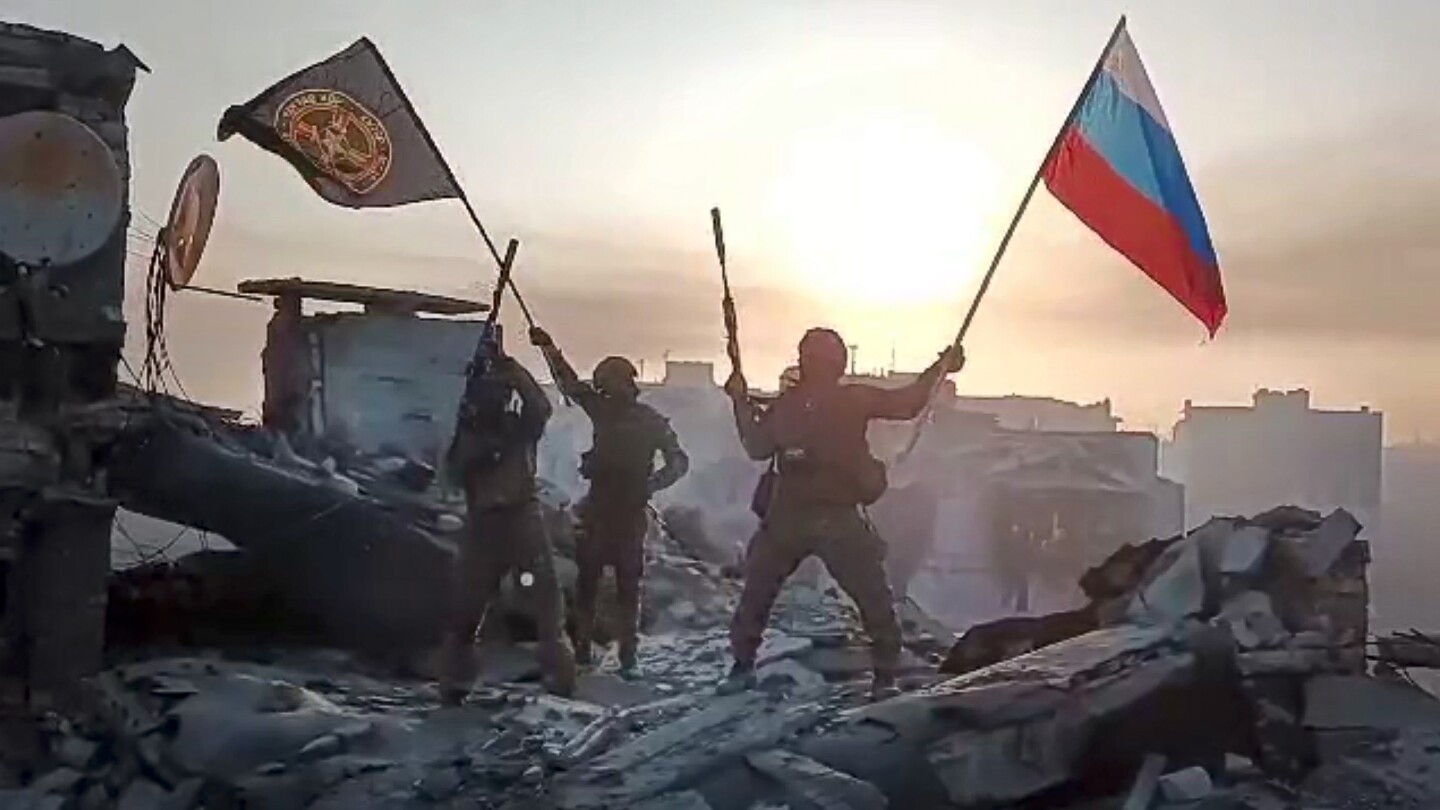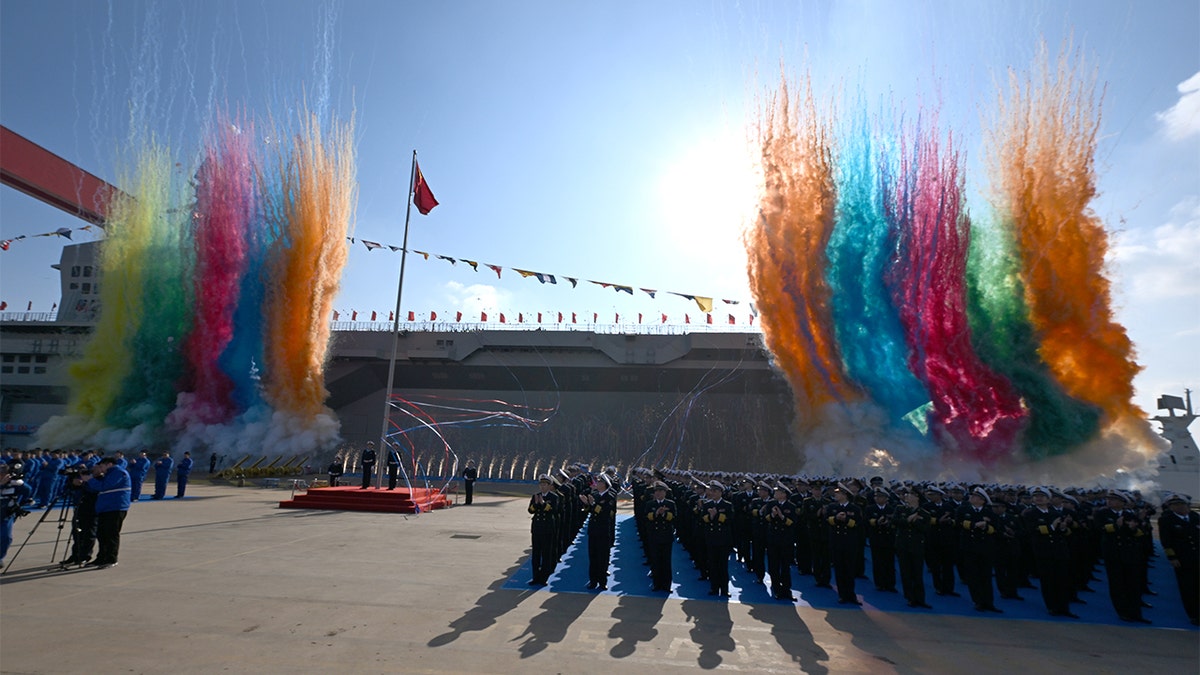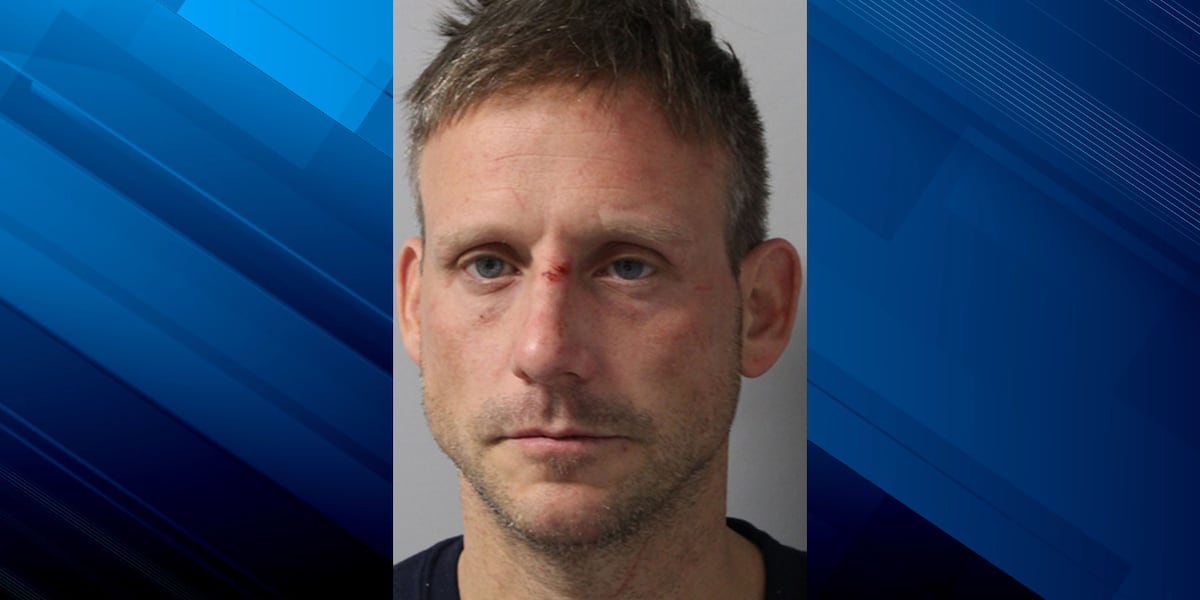World
An ex-convict returned from war and a Russian village lived in fear. Then police say he killed again

TALLINN, Estonia (AP) — When Ivan Rossomakhin returned home from the war in Ukraine three months ago, his neighbors in the village east of Moscow were terrified.
Three years ago, he was convicted of murder and sentenced to a long prison term but was freed after volunteering to fight with the Wagner private military contractor.
Back in Novy Burets, Rossomakhin drunkenly wandered the streets of the hamlet 800 kilometers (about 500 miles) east of Moscow, carrying a pitchfork and threatening to kill everyone, residents said.
One-by-one, victims stood in a Colorado courtroom to confront the person who pleaded guilty to murdering five people and injuring 17 others in a shooting last year at a sanctuary for the LGBTQ+ community.
People who have been disqualified from voting in Virginia because of their criminal records have filed a lawsuit against Gov.
Mexico says it has arrested the former head of a federal anti-kidnapping unit in connection with the disappearance of 43 students in 2014.
Prosecutors in Ohio have announced murder charges against a woman in the death of her 16-month-old daughter.
Despite police promises to keep an eye on the 28-year-old former inmate, he was arrested in a nearby town on charges of stabbing to death an elderly woman from whom he once rented a room. He reportedly confessed to committing the crime, less than 10 days after his return.
Rossomakhin’s case is not isolated. The Associated Press found at least seven other instances in recent months in which Wagner-recruited convicts were identified as being involved in violent crimes, either by Russian media reports or in interviews with relatives of victims in locations from Kaliningrad in the west to Siberia in the east.
Russia has gone to extraordinary lengths to replenish its troops in Ukraine, including deploying Wagner’s mercenaries there. That has had far-reaching consequences, as was evident this weekend when the group’s leader sent his private army to march on Moscow in a short-lived rebellion. Another has been the use of convicts in battle.
The British Defense Ministry warned of the fallout in March, saying “the sudden influx of often violent offenders with recent and often traumatic combat experience will likely present a significant challenge for Russia’s wartime society” as their service ends.
Wagner leader Yevgeny Prigozhin said he had recruited 50,000 convicts for Ukraine, an estimate also made by Olga Romanova, director of the prisoner rights group Russia Behind Bars. Western military officials say convicts formed the bulk of Wagner’s force there.
About 32,000 have returned from Ukraine, Prigozhin said last week, before his abortive rebellion against the Defense Ministry. Romanova estimated it to be about 15,000 as of early June.
Those prisoners agreeing to join Wagner were promised freedom after their service, and President Vladimir Putin recently confirmed that he was “signing pardon decrees” for convicts fighting in Ukraine. Those decrees have not been made public.
Putin recently said recidivism rates among those freed from prison through serving in Ukraine are much lower than those on average in Russia. But rights advocates say fears about those rates rising as more convicts return from war are not necessarily unfounded.
“People form a complete absence of a link between crime and punishment, an act and its consequences,” Romanova said. “And not just convicts see it. Free people see it, too -– that you can do something terrible, sign up for the war and come out as a hero.”
Rossomakhin wasn’t seen as valorous when he returned from fighting in Ukraine but rather as an “extremely restless, problematic person,” police said at a meeting with fearful Novy Burets residents that was filmed by a local broadcaster before 85-year-old Yulia Buyskikh was slain. At one point, he even was arrested for breaking into a car and held for five days before police released him March 27.
Two days later, Buyskikh was killed.
“She knew him and opened the door, when he came to kill her,” her granddaughter, Anna Pekareva, wrote on Facebook. “Every family in Russia must be afraid of such visitors.”
Other incidents included the robbery of a shop in which a man held a saleswoman at knifepoint; a car theft by three former convicts in which the owner of the vehicle was beaten and forced to sign it over to them; the sexual assault of two schoolgirls; and two other killings besides the one in Novy Burets.
In Kaliningrad, a man was arrested in the sexual assault of an 8-year-old girl after taking her from her mother, according to a local media report and one of the girl’s relatives.
The man had approached the mother and bragged about his prison time and his Wagner service in Ukraine, according to the relative, who spoke to AP on condition of anonymity out of safety concerns. The relative asked: “How many more of them will return soon?”
In its recruiting, Wagner usually offered convicts six-month contracts, according to media reports and rights groups. Then they can return home, unlike regular soldiers, who can’t terminate their contracts and leave service as long as Putin’s mobilization decree remains in effect. It wasn’t immediately clear, however, whether these terms will be honored after Prigozhin’s unsuccessful mutiny.
Prigozhin, himself a former convict, recently acknowledged that some repeat offenders were Wagner fighters -– including Rossomakhin in Novy Burets and a man arrested in Novosibirsk for sexually assaulting two girls.
Putin recently said the recidivism rate “is 10 times lower” among the convicts that went to Ukraine than for those in general. ”The negative consequences are minimal,” he added.
There isn’t enough data yet to assess the consequences, according to a Russian criminology expert who spoke on condition of anonymity out of safety concerns.
Incidents this year “fit the pattern of recidivist behavior,” and there’s a chance that those convicts would have committed crimes again upon release, even if they hadn’t been recruited by Wagner, the expert said. But there’s no reason to expect an explosive spike in crime because a significant number of the ex-convicts probably can refrain from breaking the law for some time, especially if they were well-paid by Wagner, the expert said.
He expects crime rates to rise after the war, but not necessarily due to the use of convicts. It’s something that usually happens following conflicts, he said.
The Soviet Union sent 1.2 million convicts to fight in World War II, according to a 2020 research paper by Russia’s state penitentiary service. It did not say how many returned, but the criminology expert told AP a “significant number” ended up behind bars again after committing new crimes for years afterward.
Romanova from Russia Behind Bars says there have been many troubling episodes involving convicts returning to civilian life after a stint in Ukraine.
Law enforcement and justice officials who spent time and resources to prosecute these criminals can feel humiliated by seeing many of them walk free without serving their sentences, she said.
“They see that their work is not needed,” Romanova added.
Some convicts who are caught committing crimes after returning home sometimes try to turn the tables on police by accusing them of discrediting those who fought in Ukraine — now a serious crime in Russia, she said.
Asked if that deters those in law enforcement, Romanova said: “You bet. A prosecutor doesn’t want to go to prison for 15 years.”
Yana Gelmel, lawyer and rights advocate who also works with convicts, said in an interview that those returning from Ukraine often act with bravado and bluster, demanding special treatment for having “defended the motherland.”
She paints a grim life in Russia’s prisons, with rampant and incessant violence, extreme isolation, constant submission to guards and a strict hierarchy among inmates. For prisoners in those conditions, “what would his mental state be?” Gelmel asked.
Add in the trauma of being thrown into battle — especially in places like Bakhmut in eastern Ukraine, the longest and bloodiest of the conflict, where Wagner forces died by the thousands,
“Imagine -– he went to war. If he survived … he witnessed so much there. In what state will he return?” she added.
Meanwhile, prison recruiting for duty in Ukraine apparently continues — just not by Wagner, rights groups say. The Defense Ministry is now seeking volunteers there instead and offering them contracts.
Romanova said the ministry had recruited nearly 15,000 convicts as of June, although officials there did not respond to a request for comment.
Unlike Wagner, the Defense Ministry soon will have legal grounds -– laws allowing for enlisting convicts into contractual service have been swiftly approved by the parliament and signed by Putin last week.
And unlike Wagner, the ministry is offering 18-month contracts, but many recruits haven’t been given anything to sign, ending up in a precarious position, Romanova said.
Enthusiasm among inmates to serve hasn’t waned, she said, even after thousands were killed on the battlefield.
“Russian roulette is our favorite game,” Romanova said, grimly. “National entertainment.”
___
Follow AP coverage of the Ukraine war at https://apnews.com/hub/russia-ukraine-war

World
Jay-Z’s Accuser Can Remain Anonymous, Judge Criticizes His Lawyer’s ‘Relentless’ Filings

The woman accusing Jay-Z and Sean “Diddy” Combs of sexually assaulting her when she was 13 can proceed anonymously (“at least for now”) in her lawsuit against the rappers, a judge ruled Thursday.
New York Judge Analisa Torres also condemned the legal team representing Jay-Z (real name Shawn Carter) for the “relentless filing of combative motions containing inflammatory language and ad hominem attacks [on accuser’s lawyer, Tony Buzbee],” according to a court order obtained by Variety. “Since Carter’s attorney first appeared in this case seventeen days ago, he has submitted a litany of letters and motions attempting to impugn the character of Plaintiff’s lawyer [Buzbee].”
Judge Torres continues, calling the complaints “inappropriate, a waste of judicial resources, and a tactic unlikely to benefit his client [Jay-Z].”
Jane Doe, who filed her original lawsuit against Combs in October, and re-filed it with Carter’s name in early December, will remain anonymous at this early stage of the litigation. She could still be required by the court to reveal her identity.
Alex Spiro, a lawyer for Carter, recently asked the judge to dismiss the entertainer from the woman’s lawsuit. He cited a report from NBC News that revealed the accuser had admitted to some “inconsistencies and outright impossibilities” in her allegations. His team has also issued public statements referring to Buzbee as a “1-800 lawyer” who is “in the pursuit of money and fame.”
Judge Torres denied Carter’s request to dismiss the case. Representatives for Carter did not immediately respond to Variety‘s request for comment.
In the last few weeks, Buzbee issued his own lawsuit against Roc Nation, the entertainment company owned by Carter, claiming they are using “shadowy operatives” to bribe his former clients into filing “frivolous” complaints against him. Carter has also sued Buzbee for defamation.
Jane Doe, who alleges she was 13 when Combs and Carter raped her in 2000, says she encountered the pair at an afterparty for the MTV Music Video Awards.
Carter responded to the allegation almost immediately. “You have made a terrible error in judgment thinking that all ‘celebrities’ are the same,” Carter wrote in a letter addressing Buzbee. “I’m not from your moral world. I’m a young man who made it out of the project of Brooklyn. We don’t play these types of games. We have very strict codes and honor. We protect children, you seem to exploit people for personal gain. Only your network of conspiracy theorists, fake physics, will believe the idiotic claims you have levied against me that, if not for the seriousness surrounding harm to kids, would be laughable.”
Combs has been held in a Brooklyn jail since September. He will remain there until his trial is scheduled to begin in May.
World
China unveils world's largest amphibious warship

China has launched the first of its new line of amphibious assault ships and its biggest warship yet, strengthening what is already the world’s largest navy.
The Sichuan, a type 076 new-generation amphibious assault ship, was put into the water at a launch and naming ceremony on Friday.
With a full load displacement of 40,000 tons, the warship ranks among the world’s largest amphibious assault ships, featuring a dual-island superstructure and full-length flight deck, the People’s Liberation Army Navy (PLAN) said in a statement.
JOE BIDEN POSES WITH HUNTER’S CHINESE BUSINESS ASSOCIATES IN NEWLY SURFACED PHOTOS: ‘INCREDIBLY DAMNING’
A launching ceremony is held to unveil China’s first Type 076 new-generation amphibious assault ship, the Sichuan, at Hudong-Zhonghua Shipbuilding, a Shanghai-based subsidiary of China State Shipbuilding Corp, on December 27, 2024, in Shanghai, China. (Pu Haiyang/VCG via Getty Images)
China Bugle, an news outlet associated with the PLAN’s news media center, reported the ship will play a key role in transforming and developing the Chinese navy and enhancing its combat capabilities in the far seas.
The Sichuan is capable of launching fighter jets and unmanned drones from an electromagnetic catapult. It is designed to carry ground troops in landing craft with air support.
TIK TOK DIVESTMENT COULD BE ‘DEAL OF THE CENTURY’ FOR TRUMP, HOUSE CHINA COMMITTEE CHAIR SAYS

Named after southwest China’s Sichuan Province, the independently-developed new vessel was put into the water at a launch and naming ceremony. (Pu Haiyang/VCG via Getty Images)
The ship also features “arrester technology” that Chinese researchers boast will allow fighter jets to land on its deck, similar to an aircraft carrier.
China launched its first amphibious assault ship, a type 075 class warship called the Hainan, in 2019.
CHINA WARNS US TO STOP ARMING TAIWAN AFTER BIDEN APPROVES $571M IN MILITARY AID

Chinese military officials celebrate at the launch ceremony for the Sichuan. (Pu Haiyang/VCG via Getty Images)
The PLANmi has been working on modernizing its forces for more than a decade, with the aim of being able to operate globally rather than being restricted to waters near the Chinese mainland. China first managed to launch fighter jets with the new electromagnetic technology on its homemade aircraft carrier, the Fujian, which launched two years ago.
The Sichuan will now undergo additional tests at sea.
China has the largest navy in the world and is consistently trying to upgrade its fleet. Recently, researchers found that the country is working on designing a nuclear-powered aircraft carrier, which would allow it to deploy its ships in distant waters without needing a base to refuel.
The U.S. Navy currently has 11 nuclear-powered aircraft carriers deployed in strategic locations globally, including in the Asia-Pacific.
The Associated Press contributed to this report.
World
Health worker displaced by Israeli attacks in Gaza dies of ‘extreme cold’

Many people in Gaza lack adequate shelter and are malnourished after more than a year of Israeli attacks and blockades.
A Palestinian healthcare worker has died due to “extreme” weather conditions, according to a statement by the enclave’s Ministry of Health, as severe cold compounds the hardship faced by people displaced by Israel’s relentless attacks.
The body of Al-Hakim Ahmed al-Zaharneh, who worked at the European Gaza Hospital, was found inside his tent in al-Mawasi area, west of the city of Khan Younis, southern Gaza, the ministry said on Friday.
“This incident comes in light of the difficult humanitarian conditions that displaced citizens are experiencing, as the suffering of Gaza residents increases due to low temperatures and the lack of heating means in tents,” the ministry said.
The ministry said earlier that four Palestinian babies have died in tents in recent days amid the cold weather and widespread malnutrition.
Al Jazeera’s Hani Mahmoud, reporting from Deir el-Balah in central Gaza, said that the number of casualties in vulnerable groups is increasing due to worsening weather conditions.
“For 14 months now, people here have been lacking basic necessities to help them survive these difficult conditions – even in summer,” he said.
“Now in winter, the temperature has dropped very low, [and] people in tent camps feel the cold as being [colder] than the actual levels.”
He said that mothers often lack the strength or ability to breastfeed as they are malnourished and unwell.
“The conditions are worse for vulnerable groups like babies and, in the absence of [humanitarian aid], it is natural that deaths will happen.”
The vast majority of the Gaza Strip’s 2.4 million residents have been displaced at least once since war broke out with the Palestinian group Hamas on October 7, 2023, with many people living in tents that offer little protection from the cold, rain and flooding.
The United Nations and other organisations have repeatedly decried the worsening humanitarian conditions in Gaza, as Israeli attacks and blockades severely curtail access to food, water, medicine and other supplies.
A leading United States government organisation monitoring food crises around the world withdrew a new report this week warning of imminent famine in north Gaza under what it called Israel’s “near-total blockade,” after the US asked for its retraction, US officials told The Associated Press.
The move follows public criticism of the report from the US ambassador to Israel.
The report by the Famine Early Warning Systems Network (FEWS NET) had warned that a “famine scenario” was unfolding in northern Gaza where Israel launched a renewed offensive in early October.
Meanwhile, on Friday, the director of Gaza’s Health Ministry told Al Jazeera that Israeli forces stormed the Kamal Adwan Hospital, one of the few remaining medical facilities in north Gaza, and forced the 350 people there to evacuate, including all the patients and staff. He said contact with the hospital had been lost.
Israel’s war in Gaza has killed at least 45,436 Palestinians and wounded 108,038 since October 7, 2023, according to figures released on Friday by Gaza’s Health Ministry.
An estimated 1,139 people were killed in Israel during the Hamas-led attacks that day and more than 200 were taken captive.
-
/cdn.vox-cdn.com/uploads/chorus_asset/file/24924653/236780_Google_AntiTrust_Trial_Custom_Art_CVirginia__0003_1.png)
/cdn.vox-cdn.com/uploads/chorus_asset/file/24924653/236780_Google_AntiTrust_Trial_Custom_Art_CVirginia__0003_1.png) Technology6 days ago
Technology6 days agoGoogle’s counteroffer to the government trying to break it up is unbundling Android apps
-

 News1 week ago
News1 week agoNovo Nordisk shares tumble as weight-loss drug trial data disappoints
-

 Politics1 week ago
Politics1 week agoIllegal immigrant sexually abused child in the U.S. after being removed from the country five times
-

 Entertainment1 week ago
Entertainment1 week ago'It's a little holiday gift': Inside the Weeknd's free Santa Monica show for his biggest fans
-

 Lifestyle1 week ago
Lifestyle1 week agoThink you can't dance? Get up and try these tips in our comic. We dare you!
-
/cdn.vox-cdn.com/uploads/chorus_asset/file/25672934/Metaphor_Key_Art_Horizontal.png)
/cdn.vox-cdn.com/uploads/chorus_asset/file/25672934/Metaphor_Key_Art_Horizontal.png) Technology3 days ago
Technology3 days agoThere’s a reason Metaphor: ReFantanzio’s battle music sounds as cool as it does
-

 Technology1 week ago
Technology1 week agoFox News AI Newsletter: OpenAI responds to Elon Musk's lawsuit
-

 News4 days ago
News4 days agoFrance’s new premier selects Eric Lombard as finance minister















